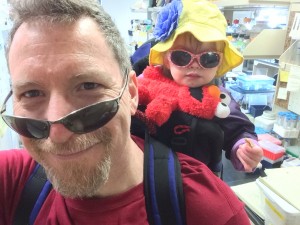 Have friends and relatives asked you questions like: “How long does it take to get your postdoctoral degree?” or, “Oh, so when do you finish your postdoctoral training position and actually get a job?”
Have friends and relatives asked you questions like: “How long does it take to get your postdoctoral degree?” or, “Oh, so when do you finish your postdoctoral training position and actually get a job?”  Yeah, me too. I explain to them that there is no “postdoctoral degree,” and that I have a postdoctoral “research position” that actually is a job. How do you explain to outsiders what “postdoctoral training” really means? I don’t have a good answer. Perhaps because I didn’t really have a plan when I went into science. I started my studies of biology at the age of 33, eleven years after finishing my B. A. as a film studies major at Wesleyan. At the time, I had been in various “day jobs,” including several years working in film and TV production and post-production in NYC, while playing in rock bands at night. I was getting deeper into debt and started thinking there’s got to be something else—something interesting—something I’d be good at--that would make me a little more money. That’s right, I got into biology research for the money. Hey, it’s all relative. Now I have a Ph.D. and several years of postdoctoral training under my belt and I’m starting to think about the future. I tend toward staying in academia (remember my aversion to money?) but I know that academic positions are hard to find these days, and grants are perhaps even harder to find. So what now? I’m happy to say, the iJOBS program at Rutgers is helping me explore other options. From iJOBS events, I have started to broaden my horizons to include at least a rudimentary understanding of careers in industry, consulting, non-profit, and contract research organizations. Even if I stay the course and get an academic position, at least I'll go into it knowing the lay of the land. Options are a good thing, folks! I’m interested in sensory neurobiology, and have primarily used the microscopic roundworm C. elegans to study sensory transduction. Currently, I am focused on the function of sensory cilia, and this interest has led me to study microtubule-based transport, as well as the structure and function of the neuronal microtubule cytoskeleton. Is this a hot topic in big pharma? I don't think so. But my most important skill—the thing I love doing that really drove me into biology research—is problem solving. And problem solvers, I’m told, are needed in both industry and academia. Figuring out where I’m headed is currently the problem I’m tackling. Stay tuned if that’s what you’re doing too. Oh, and if you have a roundabout career path to share, this is the place. How did you get here? And what's your next move?--RO
Yeah, me too. I explain to them that there is no “postdoctoral degree,” and that I have a postdoctoral “research position” that actually is a job. How do you explain to outsiders what “postdoctoral training” really means? I don’t have a good answer. Perhaps because I didn’t really have a plan when I went into science. I started my studies of biology at the age of 33, eleven years after finishing my B. A. as a film studies major at Wesleyan. At the time, I had been in various “day jobs,” including several years working in film and TV production and post-production in NYC, while playing in rock bands at night. I was getting deeper into debt and started thinking there’s got to be something else—something interesting—something I’d be good at--that would make me a little more money. That’s right, I got into biology research for the money. Hey, it’s all relative. Now I have a Ph.D. and several years of postdoctoral training under my belt and I’m starting to think about the future. I tend toward staying in academia (remember my aversion to money?) but I know that academic positions are hard to find these days, and grants are perhaps even harder to find. So what now? I’m happy to say, the iJOBS program at Rutgers is helping me explore other options. From iJOBS events, I have started to broaden my horizons to include at least a rudimentary understanding of careers in industry, consulting, non-profit, and contract research organizations. Even if I stay the course and get an academic position, at least I'll go into it knowing the lay of the land. Options are a good thing, folks! I’m interested in sensory neurobiology, and have primarily used the microscopic roundworm C. elegans to study sensory transduction. Currently, I am focused on the function of sensory cilia, and this interest has led me to study microtubule-based transport, as well as the structure and function of the neuronal microtubule cytoskeleton. Is this a hot topic in big pharma? I don't think so. But my most important skill—the thing I love doing that really drove me into biology research—is problem solving. And problem solvers, I’m told, are needed in both industry and academia. Figuring out where I’m headed is currently the problem I’m tackling. Stay tuned if that’s what you’re doing too. Oh, and if you have a roundabout career path to share, this is the place. How did you get here? And what's your next move?--RO
iJOBS Blog